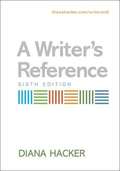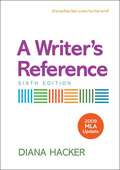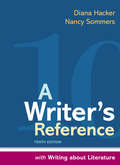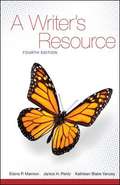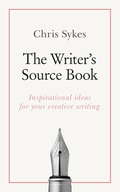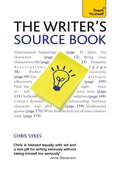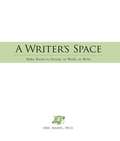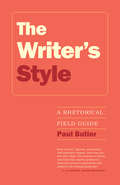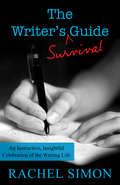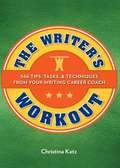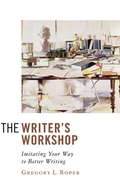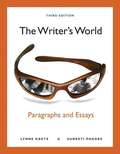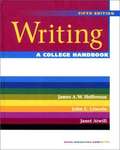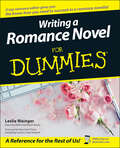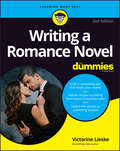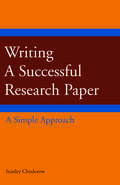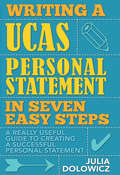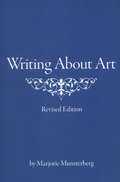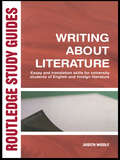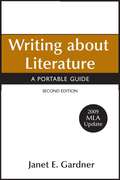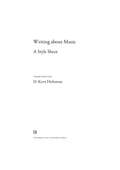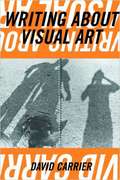- Table View
- List View
A Writer’s Reference (6th edition)
by Diana HackerA Writer's Reference is the most widely adopted college handbook ever published. The new edition is available in a classic version that provides more help with academic writing, serves a wider range of multilingual students, and lends more support for college research -- all in an easy-to-use quick-reference format. Now for all the ways you teach your course, you can choose the classic version or choose from among 4 additional versions with varied content. A Writer's Reference with Exercises is tailor-made for classroom use or for additional grammar practice with 86 integrated exercise sets. A Writer's Reference with Writing in the Disciplines provides help for college writing beyond composition with advice and models in six academic disciplines. A Writer's Reference with Writing about Literature includes an entire tabbed section on interpreting and writing about works of literature, with two annotated student essays. A Writer's Reference with Extra Help for ESL Writers includes an entire tabbed section for nonnative speakers of English; it offers targeted advice and strategies for college writing and research.
A Writer's Reference (6th Edition with 2009 MLA Update)
by Diana HackerRead this to find out more about the 2009 MLA updates and the 2010 APA updates. A Writer's Reference is the most widely adopted college handbook ever published. The new edition is available in a classic version that provides more help with academic writing, serves a wider range of multilingual students, and lends more support for college research -- all in an easy-to-use quick-reference format. Now for all the ways you teach your course, you can choose the classic version or choose from among 4 additional versions with varied content. A Writer's Reference with Exercises is tailor-made for classroom use or for additional grammar practice with 86 integrated exercise sets. A Writer's Reference with Writing in the Disciplines provides help for college writing beyond composition with advice and models in six academic disciplines. A Writer's Reference with Writing about Literature includes an entire tabbed section on interpreting and writing about works of literature, with two annotated student essays. A Writer's Reference with Extra Help for ESL Writers includes an entire tabbed section for nonnative speakers of English; it offers targeted advice and strategies for college writing and research.
A Writer’s Reference with Writing about Literature
by Diana Hacker Nancy SommersWriting about Literature is a practical guide to interpreting works of literature and to planning, composing, and documenting papers about literature. Students will find help with forming and supporting an interpretation, avoiding plot summary, integrating quotations from a literary work, observing the conventions of literature papers, and using secondary sources. Writing about Literature also includes two sample student essays — one that uses only a primary source and one that uses primary and secondary sources.
A Writer's Resource: A Handbook for Writing and Research (Fourth Edition)
by Elaine P. Maimon Janice H. Peritz Kathleen Blake YanceyA Writer's Resource focuses on the most common assignments and writing situations students will encounter in and beyond college, helping them to meet the challenges of composing in different genres and media.
The Writer's Source Book: Inspirational ideas for your creative writing
by Chris SykesLEARN NEW AND INSPIRING WAYS OF LIFTING YOUR CREATIVE WRITING.Is your creative writing in need of inspiration? Do you need confidence to create watertight plots and believable characters?The Writer's Source Book provides dozens of practical exercises to help you create storylines, craft people and generate ideas, with support and creative insight for every stage.It will give you support in identifying your genre and crafting your work around it, and help you to understand the complexities of plot and character before beginning to create your own.Inspired and inspiring exercises will help you master the structure of your book, story or play, while focused and innovative advise will help those who have run into trouble. This is a technical manual ideal for any writer who needs to build, fix, polish or perfect their storyline.ABOUT THE SERIESThe Teach Yourself Creative Writing series helps aspiring authors tell their story. Covering a range of genres from science fiction and romantic novels, to illustrated children's books and comedy, this series is packed with advice, exercises and tips for unlocking creativity and improving your writing. And because we know how daunting the blank page can be, we set up the Just Write online community at tyjustwrite, for budding authors and successful writers to connect and share.
The Writer's Source Book: Teach Yourself
by Chris SykesIs your creative writing in need of inspiration? Do you need confidence to create watertight plots and believable characters?The Writer's Source Book provides dozens of practical exercises to help you create storylines, craft people and generate ideas, with support and creative insight for every stage.It will give you support in identifying your genre and crafting your work around it, and help you to understand the complexities of plot and character before beginning to create your own.Inspired and inspiring exercises will help you master the structure of your book, story or play, while focused and innovative advise will help those who have run into trouble. This is a technical manual ideal for any writer who needs to build, fix, polish or perfect their storyline.
A Writer's Space
by Eric MaiselTo write what you want to write, the way you want to write it, you need to create both psychic and physical space. In A Writer's Space, noted creativity expert and bestselling author Dr. Eric Maisel shows you how to do just that. He takes you by the hand and guides you deep into your own creative process, helping you to: Honor your inner muse; Spark your creative impulse; Make the most of time you spend writing; Devise personalized rituals to start you writing and keep you writing; Create a work space that complements the writing process; Design a writing schedule that's easy to follow, no matter what. Calling upon his own writing experience, as well as his extensive knowledge of the creative process, Dr. Maisel will help you define the physical and mental space you need to produce the best work you've ever created, page after page!
A Writer's Space: Make room to dream, to work, to write
by Eric MaiselA Simon & Schuster eBook. Simon & Schuster has a great book for every reader.
A Writer's Space
by Eric MaiselA guide for writers to help them delve deep into their creative process.
The Writer's Style: A Rhetorical Field Guide
by Paul ButlerDesigned to help all writers learn to use style as a rhetorical tool, taking into account audience, purpose, context, and occasion, The Writer’s Style is not only a style guide for a new generation but a new generation of style guide. The book helps writers learn new strategies inductively, by looking at firsthand examples of how they operate rhetorically, as well as deductively, through careful explanations in the text. The work focuses on invention, allowing writers to develop their own style as they analyze writing from varied genres. In a departure from the deficiency model associated with other commonly used style guides, author Paul Butler encourages writers to see style as a malleable device to use for their own purposes rather than a domain of rules or privilege. He encourages writing instructors to present style as a practical, accessible, and rhetorical tool, working with models that connect to a broad range of writing situations—including traditional texts like essays, newspaper articles, and creative nonfiction as well as digital texts in the form of tweets, Facebook postings, texts, email, visual rhetoric, YouTube videos, and others. Though designed for use in first-year composition courses in which students are learning to write for various audiences, purposes, and contexts, The Writer’s Style is a richly layered work that will serve anyone considering how style applies to their professional, personal, creative, or academic writing.
The Writer's Survival Guide: An Instructive, Insightful Celebration of the Writing Life
by Rachel SimonThis inspirational guide for aspiring and experienced writers was originally published in 1997. Written in a friendly, hopeful, and gently humorous tone, it focuses on the creative process and emotional ups and downs of the creative life, providing insights into how to persist in the face of rejection, frustration, feelings of inadequacy, lack of support from loved ones, and more. It also offers practical how-to advice, from organizing your time so you actually sit down and write to reading as a writer. This ebook's rerelease of The Writer's Survival Guide includes a new introduction that discusses the origins of the book and how, in spite of the many changes in publishing and technology, it remains relevant today.
The Writer's Workout
by Christina KatzThe inspiration, stamina, and power to take charge of your writing life--every day.Get the daily jolt of energy your writing life needs from The Writer's Workout. Inside you'll find manageable, no-nonsense techniques for every aspect of your writing career from getting organized to connecting with your audience to building relationships.Veteran writing coach Christina Katz draws on her knowledge from more than a decade in the business to give you tips, exercises, and insider strategies to build your skills.Make your writing as strong and powerful as possible.Pitch and sell your work at every opportunity.Overcome rejection to come back better than ever.Promote your work and build an audience.Learn how to balance your creative life with your daily life.With The Writer's Workout, you'll develop skill, strength, and confidence - everything you need to build a robust, unique writing career that's built to last.Bonus online exclusive: Download a free motivational poster to keep you moving as your build your writing career at writersdigest.com/writers-workout.
The Writer's Workout
by Christina KatzThe inspiration, stamina, and power to take charge of your writing life'every day. Get the daily jolt of energy your writing life needs fromThe Writer's Workout. Inside you'll find manageable, no-nonsense techniques for every aspect of your writing career from getting organized to connecting with your audience to building relationships. Veteran writing coach Christina Katz draws on her knowledge from more than a decade in the business to give you tips, exercises, and insider strategies to build your skills. Make your writing as strong and powerful as possible. Pitch and sell your work at every opportunity. Overcome rejection to come back better than ever. Promote your work and build an audience. Learn how to balance your creative life with your daily life. WithThe Writer's Workout, you'll develop skill, strength, and confidence ? everything you need to build a robust, unique writing career that's built to last. Bonus online exclusive: Download a free motivational poster to keep you moving as your build your writing career at writersdigest. com/writers-workout.
The Writer's Workshop: Imitating Your Way to Better Writing
by Gregory L. RoperThe Writer’s Workshop takes an approach to teaching writing that is new only because it is so old. Today, rhetoric and composition typically proceed by ignoring what was done for 2,500 years in Western education. Gregory Roper, on the other hand, helps students learn to write in the way the great writers of the past themselves learned: by carefully imitating masters of the craft, including Cicero, Thomas Aquinas, Charles Dickens, Sojourner Truth, James Joyce, and Ernest Hemingway. By living in their workshops and apprenticing to these and other masters, apprentice writers—like apprentice musicians, painters, and blacksmiths of the past—will rapidly improve the complexity of their art and discover their own native voices.Interspersed into chapters full of sound practical advice and challenging assignments are reflections on Great Ideas from “Realism and Impressionism” to “Nominalism and Modern Science.” Perfect for the college or even high school writing classroom—as well as a marvelous book for homeschoolers and others who would like to improve their own writing—The Writer’s Workshop is a fine practical guide, and Dr. Roper a friendly yet demanding teacher-mentor.
The Writer's World: Paragraphs and Essays (3rd Edition)
by Lynne Gaetz Suneeti PhadkeThe Writer's World series was written to address the diverse needs of today's students: students whose first language is not English, students who respond favorably to visuals, and students who have varying skill levels.
Writing: A College Handbook (5th edition)
by James A. W. Hefferman John E. Lincoln Janet AtwillThe Fifth Edition exemplifies in clear, engaging prose the skills that students need to communicate in a wide variety of rhetorical contexts. A reliable and easy-to-use reference tool and an up-to-date rhetoric and research guide, Writing: A College Handbook invites students to discover the power of effective writing.
Writing a Romance Novel For Dummies
by Leslie WaingerIn love with romance novels? You’re not alone! Romance is today’s most popular fiction genre, accounting for more than half of all mass market fiction sold. If you’re looking to make a serious effort at writing a romance and getting it published in today’s multifaceted markets, you need to learn as much as you can about this highly successful field—especially how to create the perfect heroes and heroines. Now, in this easy, step-by-step guide, a top romance editor gives you the know-how you need to succeed as a romance novelist! Writing A Romance Novel For Dummies is perfect for both beginning and more accomplished writers who are looking to get the leading edge on writing a romance novel and get it published. Leslie Wainger, Executive Editor at Harlequin Books, explains what it takes to become the next Nora Roberts, providing the techniques you need to: Select a pseudonym Write a compelling, heartfelt story Find the right agent and publisher Submit a manuscript Market your novel Join clubs and associations Packed with insider advice, this plain-English guide helps you grasp the building blocks of a great romance, providing practical tips on the craft of writing as well as savvy pointers on how to hook your reader from page one, write with passion, and shape a proposal that will wow agents and editors. You get lots of expert tips on analyzing the marketplace, creating compelling characters, and finding your own voice. Wainger also: Demystifies the sub-genres of the romance world, from historical, contemporary, and multicultural to paranormal, romantic suspense, and Christian/inspirational Explains plotting, pacing, and writing those crucial love scenes Discusses how to conduct research, assign credits, and get permissions Helps you decide whether it’s best to write alone or with a partner Complete with a manuscript preparation checklist, tips for revising your work smoothly and successfully, guidance in understanding and negotiating a contract, and a list of romance writing resources, Writing A Romance Novel For Dummies is your one-stop guide to becoming a published novelist!
Writing a Romance Novel For Dummies
by Leslie Wainger Victorine LieskeGet your romance (writing) on! Writing a Romance Novel For Dummies is the only reference aspiring writers need to get their careers off to the right start. Fully updated to reflect the industry's latest trends and secrets, this book helps you understand what makes a great novel, so you can hone your craft and write books people want to read. We break down the romance subgenres, give you expert tips on plotting and pacing, and walk you through the process of finding an agent and getting published in today’s competitive market—or self-publishing like many six-figure authors are doing. For aspiring writers longing to find success in the industry, Writing a Romance Novel For Dummies is easy to read, highly informative, and a must-have! Refine your writing to craft engaging stories readers can’t put down Find a route to publication that works for you—mainstream, or self-published Understand the ins and outs of the romance genre and its subgenres Learn how to get your work noticed in the popular world of romantic fiction This Dummies guide is perfect for beginning writers who want advice on writing and publishing a successful romance novel. It’s also a great reference for accomplished writers looking to level up their romance game.
Writing a Successful Research Paper: A Simple Approach
by Stanley ChodorowThis brief, practical guide offers a clear and comprehensive strategy for conceptualizing, approaching, and executing the task of writing a research paper in the humanities and social sciences. In addition, it provides: a critical and process-oriented approach to the tasks of topic selection, formulation of the research question, thesis development, and argumentation.judiciously selected examples drawn from a broad range of disciplines.concise treatment of the aims, methods, and conventions of scholarly research, including the opportunities and pitfalls of Internet use.a wealth of conceptual and organizational tools, and more.
Writing a UCAS Personal Statement in Seven Easy Steps: A Really Useful Guide To Creating A Successful Personal Statement
by Julia DolowiczThis friendly and accessible workbook takes you through a series of activities that will help you to gather information about your self and condense it into the format required to complete your UCAS personal statement for university. You will use a seven step process that will build your confidence and help you create a compelling personal statement. Reading the book is like being in a coaching session with the author; the tone is light and supportive, and you will be carried along through specific exercises that culminate in the completion of a really effective Personal Statement. * Collect it - identify your positive traits, skills, abilities and accomplishments and feel confident about promoting yourself on paper. * Expand it - create a 'degree specification profile' to see what the departments are looking for with respect to the courses that interest you. * Prove it - evidence of your skills by listing examples from your life, inside and outside education. Think about what you are offering in terms of strengths and what needs further development. * Draft it - note down your findings so far and start thinking about how to structure them. * Build it - begin building the structure of your statement and formulate your sentences. * Review it - read hints about structure, spelling, grammar, punctuation and formatting, plus guidance on receiving feedback. * Submit it - a last chance for reflection, re-jigging, and refining; and for reassurance before you submit your statement!
Writing About Art (Revised Edition)
by Marjorie MunsterbergWriting About Art was written as the text for a course of the same name required of all art majors at The City College of New York. The book explains the different approaches college students encounter in undergraduate art history classes. Each chapter outlines the characteristics of one type of visual or historical analysis and briefly explains its history and development. Passages by well-known art historians provide examples of each method. Sample essays by students are accompanied by extensive explanations of suggested revisions. The book also includes a step-by-step guide to researching art historical topics and a section about correctly citing sources.
Writing About Literature: Essay and Translation Skills for University Students of English and Foreign Literature
by Judith WoolfWriting about Literature combines detailed practical and scholarly advice with a sense of the scope and creative possibilities of literary criticism, empowering the student reader to make his or her own discoveries and experiments with language. In addition, it gives valuable guidance on adult language learning and translation skills for students of foreign literature. This handy, accessible guide covers all aspects of the essay-writing process, including: preliminary reading and choosing and researching a topic referencing and presentation computer use style, structure, vocabulary, grammar and spelling the art and craft of writing scholarly and personal insights into the problems and pleasures of writing about literature. Written in an entertaining and informative way and containing a wealth of practical advice and scholarly insights, this wise, witty and helpful book should be on every literature student's bookshelf.
Writing about Literature A Portable Guide (2nd Edition, 2009 MLA Update)
by Janet E. GardnerWriting about Literature introduces strategies for reading literature, explains the writing process and common writing assignments for literature courses, provides instruction in writing about fiction, poetry, and drama, and includes coverage of writing a research paper and of literary criticism and theory. This volume in Bedford/St. Martin's popular series of Portable Anthologies and Guides offers the series' trademark combination of high quality and great value for teachers looking to assign supplementary instruction on reading and writing about literature to their students.
Writing about Music
by D. Kern HolomanHow do you spell "Mendelssohn"? Where do you place the hyphen in "Beethoven" if it breaks between two lines? Is it "premiere" or "première"? The answers and much more can be found in this completely revised and updated resource for authors, students, editors, concert producers--anyone who deals with classical music in print. This essential volume covers some of the thorniest issues of musical discourse: how to go about describing musical works and procedures in prose, the rules for citations in notes and bibliography, and proper preparation of such materials as musical examples, tables, and illustrations. One section discusses program notes, another explains the requirements for submitting manuscripts and electronic files. A new section outlines best practices for student writers. An appendix lists common problem words.
Writing about Visual Art
by David CarrierDavid Carrier examines the history and practice of art writing and reveals its importance to the art museum, the art gallery, and aesthetic theory. Artists, art historians, and art lovers alike can gain fresh insight into how written descriptions of painting and sculpture affect the experience of art. Readers will learn how their reading can determine the way they see painting and sculpture, how interpretations of art transform meaning and significance, and how much-discussed work becomes difficult to see afresh.
